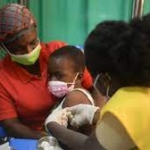
The Oti Region has recorded 10,233 confirmed cases of typhoid fever in the first half of 2025, sparking urgent public health concerns.
According to the Regional Health Directorate, the alarming surge highlights the critical need for improved sanitation and access to safe drinking water, as typhoid fever is primarily transmitted through contaminated food and water.
Regional Environmental Health Officer, Cynthia Sekyere, described the situation as deeply worrying, citing poor sanitation, weak waste management systems, and limited access to potable water as key drivers of the outbreak.
“We have data from the Oti Health Directorate indicating a total of 10,233 confirmed cases of typhoid fever between the first and second quarters of this year. The first quarter alone recorded 4,417 cases, with 5,816 more cases confirmed in the second quarter. This is a public health concern,” she stated.
To address the crisis, the Oti Regional Coordinating Council (ORCC) has partnered with environmental health officers to inaugurate a sanitation task force. The task force will implement comprehensive sanitation programmes, improve waste disposal systems, and launch clean water initiatives.
Krachi West’s Municipal Chief Executive, Prosper Addo, emphasised community participation as key to fighting the outbreak:
“The outbreak is hitting vulnerable populations the hardest. Community involvement is essential in promoting hygiene practices and supporting efforts to curb this public health challenge.”
The task force is also expected to enforce sanitation bylaws and prosecute offenders who flout regulations.
Health authorities are urging residents to adopt proper hygiene practices, drink safe water, and fully cooperate with ongoing interventions to stem the spread of typhoid across the region.